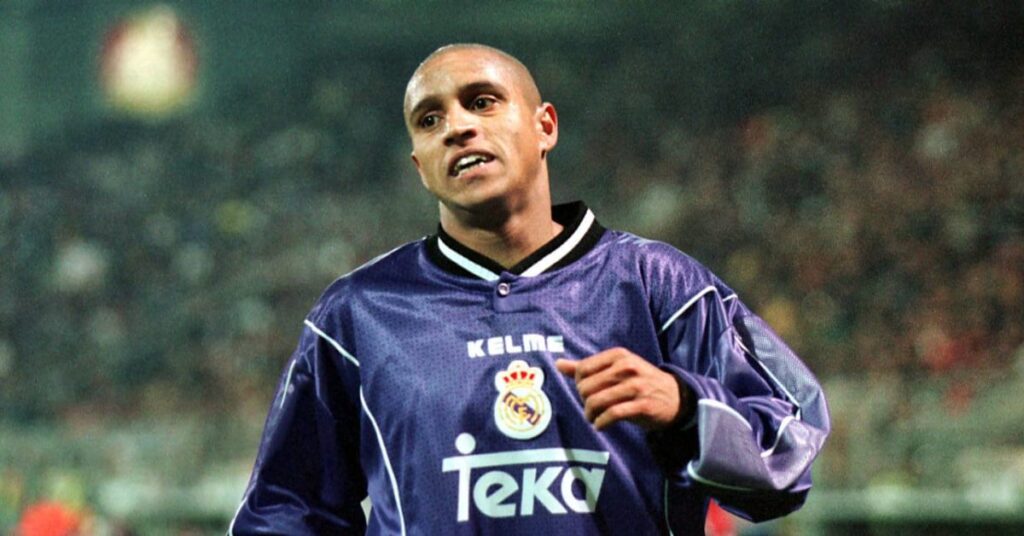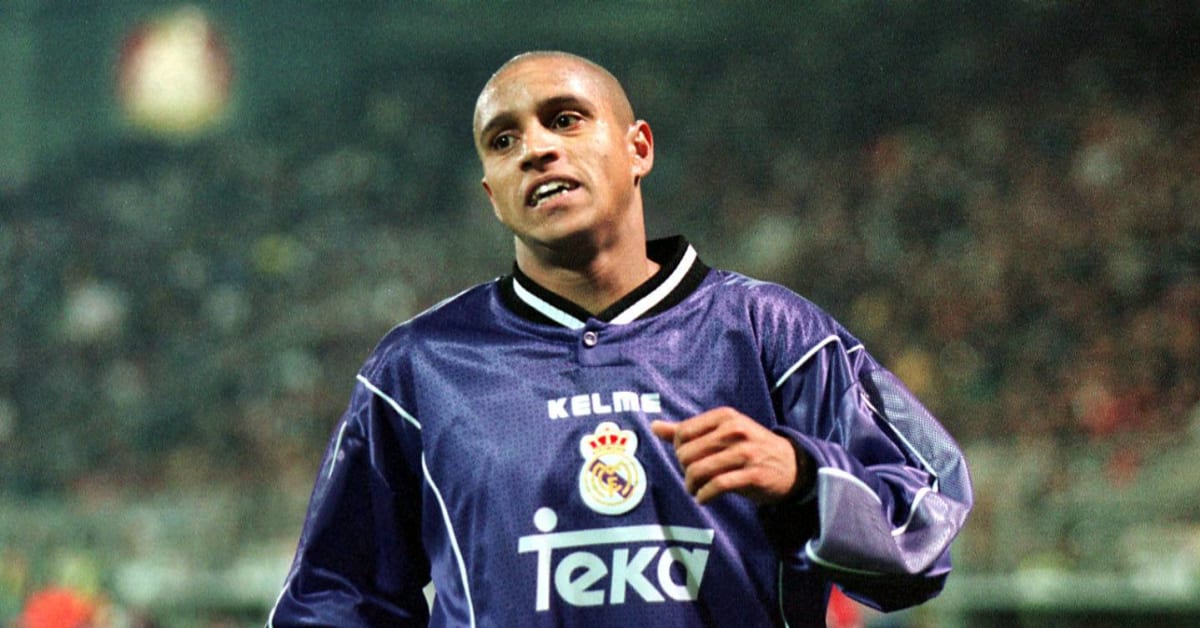
Roberto Carlos Full Name: Unveiling the Legend Behind the Thunderous Left Foot
When the name Roberto Carlos echoes through the halls of football history, images of a blistering left foot, gravity-defying free kicks, and relentless attacking runs immediately spring to mind. But beyond the iconic status and legendary goals, lies a full name that embodies the rich Brazilian footballing tradition. So, what is Roberto Carlos’s full name? It’s Roberto Carlos da Silva Rocha. This article delves into the significance of his name, his illustrious career, and the legacy he left on the beautiful game.
The Significance of Roberto Carlos da Silva Rocha
In Brazilian culture, names often carry a deep significance, reflecting family history, hopes, and aspirations. Roberto Carlos da Silva Rocha is no exception. The name ‘Roberto’ itself is a common and respected name. ‘Carlos’ is a popular choice, often given in honor of saints or family members. ‘da Silva’ is a very common Portuguese surname, indicating ancestry and lineage. Finally, ‘Rocha’ provides a unique identifier within the vast ‘da Silva’ family tree.
The combination of these names creates a unique identity for the footballer who would go on to become one of the most recognizable and celebrated players in the world. His full name, Roberto Carlos da Silva Rocha, represents both his individuality and his connection to his Brazilian heritage.
Early Life and Career Beginnings
Born in Garça, São Paulo, Brazil, on April 10, 1973, Roberto Carlos’s journey to football stardom began humbly. He started his professional career with União São João, showcasing the raw talent and explosive power that would later define his playing style. Even in his early days, the name Roberto Carlos was starting to generate buzz within Brazilian football circles.
His performances quickly attracted attention, leading to a move to Palmeiras, one of Brazil’s biggest clubs. It was at Palmeiras that Roberto Carlos truly began to shine, winning two Brazilian league titles and establishing himself as a key player. His attacking prowess from left-back was revolutionary, and the world was starting to take notice of Roberto Carlos.
European Conquests: Inter Milan and Real Madrid
In 1995, Roberto Carlos made the leap to European football, joining Inter Milan in Italy. While his time at Inter was relatively short, it provided him with valuable experience and exposure to a different style of play. However, it was his move to Real Madrid in 1996 that would solidify his place among football’s elite.
At Real Madrid, Roberto Carlos spent 11 glorious seasons, becoming an integral part of one of the most successful teams in the club’s history. He won four La Liga titles and three Champions League crowns, etching his name into the hearts of Madridistas forever. His partnership with fellow Galácticos like Zinedine Zidane, Ronaldo, and David Beckham created a team that dominated European football for years. The name Roberto Carlos became synonymous with Real Madrid’s success during this era.
His thunderous left foot became legendary. He scored countless spectacular goals, including free kicks that defied physics and left goalkeepers helpless. Remember that free kick against France? The one that curved impossibly? That’s the Roberto Carlos magic we all remember. His contributions weren’t just limited to scoring; his tireless running, pinpoint crosses, and solid defending made him a complete full-back.
International Glory with Brazil
Roberto Carlos’s impact extended beyond club football. He was a key member of the Brazilian national team for over a decade, representing his country in three World Cups (1998, 2002, and 2006). In 2002, he achieved the ultimate glory, winning the World Cup in South Korea and Japan. His contributions to the Seleção were immense, and he is rightfully considered one of the greatest Brazilian players of all time. Wearing the famous yellow jersey, Roberto Carlos consistently delivered world-class performances.
He was a part of a golden generation of Brazilian footballers, alongside Ronaldo, Rivaldo, and Ronaldinho. Together, they formed a formidable attacking force that terrorized defenses around the world. Roberto Carlos’s presence on the left flank provided the perfect balance to Brazil’s attacking play.
Later Career and Retirement
After leaving Real Madrid in 2007, Roberto Carlos continued his career with Fenerbahçe in Turkey, Corinthians in Brazil, Anzhi Makhachkala in Russia, and Delhi Dynamos in India. Even in the later stages of his career, he continued to display glimpses of the brilliance that had made him a global icon. His passion for the game never waned, and he remained a popular figure wherever he played.
Following his retirement from professional football, Roberto Carlos transitioned into coaching and management roles. He has held positions at various clubs, including Anzhi Makhachkala and Delhi Dynamos, sharing his experience and knowledge with the next generation of players. Roberto Carlos has always been dedicated to giving back to the sport that has given him so much.
The Legacy of Roberto Carlos da Silva Rocha
The legacy of Roberto Carlos da Silva Rocha extends far beyond his impressive list of titles and accolades. He revolutionized the role of the full-back, transforming it from a purely defensive position into an attacking weapon. His explosive pace, powerful shots, and pinpoint crosses set a new standard for full-backs around the world. He inspired countless young players to emulate his style of play, and his influence on the modern game is undeniable.
He is more than just a footballer; he is an icon, a legend, and an inspiration. His name, Roberto Carlos, will forever be associated with skill, power, and passion. He will be remembered for his spectacular goals, his tireless work ethic, and his unwavering commitment to his team. His impact on the beautiful game is immeasurable, and he will continue to inspire generations of footballers to come.
His free kicks are still talked about today. Scientists have even studied the physics behind his famous banana shot against France, trying to understand the complex trajectory that defied conventional wisdom. Roberto Carlos‘s left foot was truly a force of nature.
Roberto Carlos‘s career is a testament to the power of hard work, dedication, and unwavering belief in oneself. From humble beginnings in Brazil to the pinnacle of world football, he achieved everything he set out to do. His story is an inspiration to aspiring footballers around the world, proving that anything is possible with enough talent and determination.
In conclusion, Roberto Carlos da Silva Rocha is more than just a name; it’s a symbol of footballing excellence. It represents a career filled with passion, skill, and unforgettable moments. He will forever be remembered as one of the greatest full-backs of all time. The name Roberto Carlos will continue to echo through the stadiums and hearts of football fans worldwide for generations to come. [See also: Best Left Backs in Football History] and [See also: Real Madrid Legends]. He is a true legend of the game, and his legacy will endure for years to come. Remembering Roberto Carlos means remembering football at its most exciting and passionate. His impact on the sport is undeniable, and his name will forever be etched in the annals of football history. The legend of Roberto Carlos lives on.
